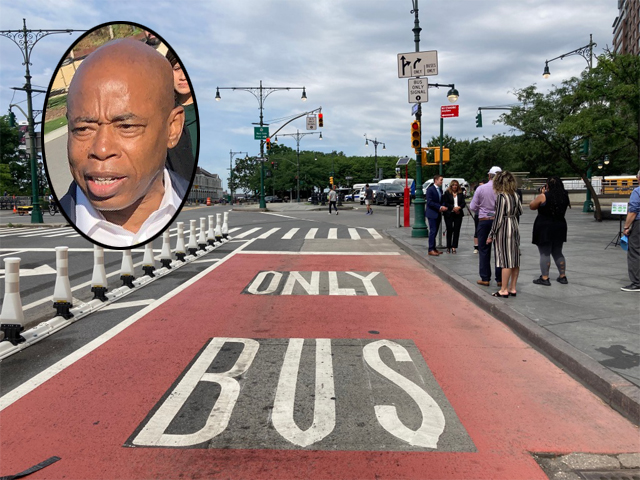Mayor Eric Adams is the latest elected official to get on the free buses train — even as his administration remains behind on its own commitments to improve bus service.
Adams endorsed a proposed pilot program that would make two bus routes free in each borough — for a total of ten free buses — in a video made after hosting progressive lawmakers for a dinner at Gracie Mansion this past weekend.
"I strongly support the thought of having 10 buses being free on lines in the city. I think it would make a major impact," said Adams.
"Our transit system is the lifeblood of our city, I use it all the time, let's see if we can get this over the hump."
We have a broad coalition in the fight to make 10 NYC bus routes free—from the Assembly to the Senate & now…Mayor Eric Adams
— Zohran Kwame Mamdani (@ZohranKMamdani) April 18, 2023
No matter our place on the political spectrum, we know free buses would be a huge win for working-class NYers who rely on public transit. The time is now pic.twitter.com/iRNAIEQdBC
The concept began as part of the "Fix the MTA" package pushed by Assembly Member Zohran Mamdani and progressive allies, then wound up in the budget proposals that both the Assembly and State Senate sent to the governor — who had her own plan to rescue the cash-strapped MTA that did not include free buses.
Mamdani (D-Queens) called the mayor's new backing proof that the idea of free buses can bridge New York's center-left political divide.
"The mayor and I, it's no secret that we do not see eye to eye on a whole host of issues," he said. "But here is one area where it's clear to both of us that making buses free would be a transformative decision for working class New Yorkers across all five boroughs, one that would allow their commutes to be faster, to be safer to be more universally accessible."
One plank of the Fix the MTA package that is a priority for transit advocacy groups — funding for more frequent service on buses and trains — was not in any legislative or executive proposal, but Mamdani said he is still fighting for its inclusion in the final product. The budget was due April 1 but is beginning to rival the rumored return of CM Punk in terms of its endless horizon and rumor mill grist.
"The free bus pilot is alive, but it is not alive at the expense of something else," Mamdani said.
"Even though funding for frequency was not included in any of those three budgets, it still is still alive as part of negotiations in for this final budget."
Yet even as Adams' backing of the free bus pilot shows the concept's political popularity, City Hall's other pro-bus initiatives have mostly fallen by the wayside due to political interference.
Adams came to office pledging to build 150 bus lanes by the end of his four-year term, but that effort is already off to a rocky start, as Streetsblog has reported.
The city built just 11.95 miles of the dedicated or camera-protected bus lanes last year — far less than the pace it would need to build to meet Adams's goal. Some projects, like bus lanes on Fordham Road, fell aside due to political opposition.
DOT has told the MTA it will fail to hit its initial target of 30 miles of bus lanes in 2023, Streetsblog previously reported. The agency has presented just one bus lane project to community boards so far this year — an update to the Gun Hill Road bus lane project.
Elsewhere, DOT plans to finish projects announced last year including Northern Boulevard in Queens, University Avenue in the Bronx, and Livingston Street in Brooklyn, according to agency spokesperson Vin Barone. Barone did not provide a list of other projects planned for 2023.
MTA Chairman and CEO Janno Lieber, who has his own role to play implementing faster bus boarding, declined to comment on the mayor's free bus awakening, but urged the city to live up to its "ambitious" bus lane agenda.
"Whatever version whatever mix of lanes they want to do, we're for — but we also want to be ambitious because [the] bus has got to be faster than walking," he said. "At the end of the day, they have to be willing to commit to which bus lanes they want to do and how many."
Time is running out for Gov. Hochul and state legislators to rescue the MTA from financial peril, Lieber warned.
"We're not we're not running out of money to run service today, but for planning reasons and because so much of what we do requires bureaucratic processes and public hearings and so on, we need to get it going," he said.
"If this goes on and on and on, the consequences are not uncertain. The massive fare increases, potentially service cuts. God forbid, layoffs. The administrative procedures associated with all of those downside scenarios take so long, we can't wait forever."
The MTA won’t be adding a peak hour City Ticket, the discount commuter rail fare for intracity travel, until the state budget is finished according to Lieber
— Good Idea Dave (@DaveCoIon) April 18, 2023






